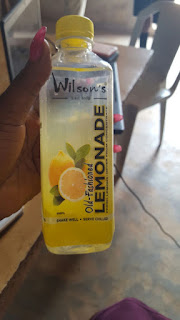Nigerians Urged To Buy Local Products To Turn Around Import Economy
 Six years ago, an investment of 10 US dollars and a bucket of lemons launched a Nigerian lemonade business that is worth 10 million US dollars today. Wilson's Juice Company buys truck loads of locally grown lemons and produces between 2000 to 2500 cartons of lemonade daily.
Six years ago, an investment of 10 US dollars and a bucket of lemons launched a Nigerian lemonade business that is worth 10 million US dollars today. Wilson's Juice Company buys truck loads of locally grown lemons and produces between 2000 to 2500 cartons of lemonade daily.With the recent fall in the naira following a plummet in oil prices, Nigeria, Africa's biggest crude exporter put in place restriction on imports in a bid to boost local industry. This and the shortage of dollars, have been good news for homegrown companies like Wilson's which for years have had to compete with vast imports from Europe and South Africa.
Nigerian officials and private sector players are renewing a push to promote local industries and save the economy. Social media campaigns have urged Nigerians to buy products "Made in Naija."
The Nigerian senate recently through Senator Eyinnaya Abaribe adopted a motion seeking the amendment of the Procurement Act to compel all government agencies and institutions to give priority to local industries.
Nigeria has tens of thousands of farmers, most of whom work on a subsistence basis and live on less than 2 dollars a day. The country produces 1.5 million tonnes of tomatoes annually of which 45 percent perish. it is also among the world's largest importers of rice and the biggest buyer of U.S. wheat, while the much of its own fertile land lies fallow. Poor infrastructure, unreliable electricity supply and lack of machinery and warehousing are some of the problems keeping farmers back. President Muhammadu Buhari has said a strengthened agricultural sector would create jobs and reduce reliance on costly food imports.
Nigeria has a population of over 170 million people, some analysts say the "Buy Naija" campaign is about national pride and may not have an immediate effect on the economy, but it is in the spirit of harnessing Nigeria's own resources and the campaign to diversify from oil.
Seyi Abolaji, co founder of Wilson's Juice Company say they are up to the task and are calling for more support and improvement of things like infrastructure, and access to financing, but that producers must also work on packaging and boosting the quality of processed goods.
Video as used by CCTV
Picture Coutesy: Tara Fagbuyi












Comments
Post a Comment